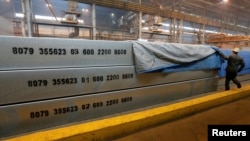Japan, Russia and Turkey have warned the United States about potential retaliation for its tariffs on steel and aluminium, the World Trade Organization said on Tuesday, bringing the total U.S. tariff bill to around $3.5 billion annually.
The three countries detailed their compensation claims in notifications to the world trade body, following similar moves by the European Union, India and China. Each showed how much the disputed U.S. tariffs would add to the cost of steel and aluminium exports to the United States, based on 2017 trade.
Russia said the U.S. tariffs, which President Donald Trump imposed in March, would add duties of $538 million to its annual steel and aluminium exports. Japan put the sum at $440 million. Turkey added a further $267 million.
China, the 28-nation EU and India have put their claims at $612 million, $1.6 billion and $165 million respectively.
They all reject the U.S. view that the import tariffs – 25 percent on steel and 10 percent on aluminium -- are justified by U.S. national security concerns and are therefore exempt from the WTO rules.
They say the U.S. tariffs have all the hallmarks of "safeguards", a trade restriction that can be legitimately used to protect a struggling industry from an unforeseen surge in imports.
A country using safeguards must compensate other WTO members who stand to lose out from the restriction on their trade, normally by rebalancing their trading relationship with a net increase in imports of other goods.
But the United States denies its tariffs are safeguards and has offered no compensation, prompting the retaliatory action.
The compensation would normally take years, but because the U.S. steel and aluminium sectors were not facing an absolute increase in imports, the WTO rules permitted retaliation in just 30 days' time, they said.
Japan said it was free to impose at least $264 million of its retaliation after 30 days, suggesting that the rest might be delayed, since some of the U.S. products covered by the tariffs were subject to an absolute increase in imports from Japan.
Neither Russia nor Japan specified how they might retaliate against U.S. exports, but Turkey listed 22 U.S. goods that it was planning to target, ranging from nuts, rice and tobacco to cars and steel products.





